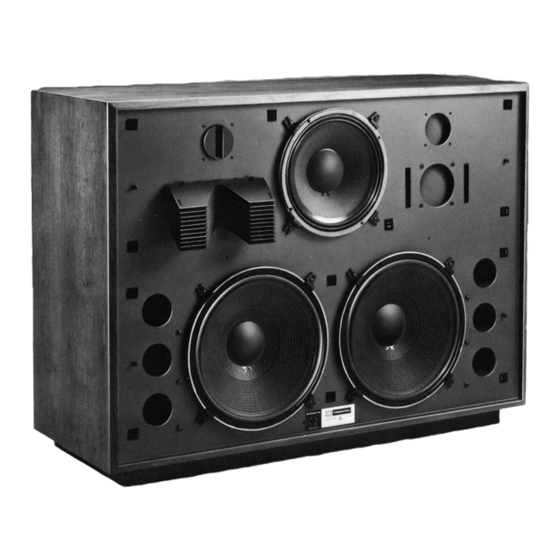
Advertisement
Quick Links
Installation
The 4350 has provision for mirror image mounting of the high
frequency components to minimize or maximize acoustic
separation between systems, as desired. The system is shipped
with all drivers installed in the "left-hand" configuration. When the
two hign frequency units are interchanged with their respective
cover plates on the right side ot the battle panel, the system will
be considered to be in the right-hand' configuration. Three of
the mosl useful acoustical arrangements for a pair of 4350 s are
shown on the next page as examples ol the several possibilities,
sucn as inverted suspension or multi-unit arrays, that exist.
Specific mounting instructions are provided under Component
Removal, starting on page 4 of this manual.
Determination of the preferred configuration for each 4350
should be made only after careful audition (and/or measurement)
of the total sound reproduction chain with each monitor placed
in its final room position. If additional treble separation isdesired,
the hign frequency components of the unit intenoed for right-hand
placement can be remounted to increase their physical distance
Maximum Separation
Minimum Separation
Moderate Separation
Utilizing A Pair 01 4350s
Rigfi- anc left-hand nomenclature has been adooteo only as a
convenient reference. Using :wo 4350s in the right-hand configuration
wojld orovioe ihe sarre separation as a pa
lell-hand coniig jration
1
' of un is in the ongma.
from the other syster Conversely, a reouction of treble
seoaration can be achieved by mounting the high frequency
transducers ot the un.t on tne left to minimize the acoustic
distance between systems. In many instances - wiere consistent
driver spacing is pre'erred. or if the listener is fa' enough from
me enclosures so tnat inaividuai sourd sources cannot D O
perceived --changing the configuration will not be necessary
The high frequency acoustic lens is packed wiln Ihe grilles m a
separate container. It should oe positioned on the enclosure
baffle panel over the mouth ot the high frequency horn Mounting
tape on the Da*fle panel and on the appropriate surfaces of the
lens holds the unit in position.
Placement
For optimum source localization within tne stereo image, a pair
of 4350s sho-ld oe arranged so that the listening pos'tion is
centered between tne two systems and no more than 30° off axis
horizontally ( O ' 15° vert calty; from eithe' unit If three or more
4350s are used tne enclosuresshou'd beanged toward ihe
nonzontat center line of tne array to obtain the recommendeo
pattern overlap at tne hstenirg position Note: A minimum
distance ol 2.5 metres (8 feet) should be maintained between tne
4350 and the listener
Eye bo'ts are provided or. tne bottom of the enclosure to allow
inverted suspension The eye bolls are anchored to a neavy cuty
stee: brace boitec to tne baffle panel and to tre bottom pane* of
the enclosure To preserve the clean visual lines ol tne enclosure,
the base may be removed wnen tne eye bolts are utii zed if the
base is removed [n<ne machine screws threaded mtoT-nuts). the
screws should be replaced to maintain the air-tight seal oflhe
acoustic chamber
Grilles
The two grille sections of the 4350 are secured to tho enclosure
with mojnting tape and positioned by oowe' pins at the ends of
each assembly. The J 3 L nameplate. ;ocatec on tne upper gm e
section. is held in place with removable spring ciips An alternate
mounting position is provided at the opposite end ot tne gnie so
that the namepiate can be moved to avoo interference with the
nigh frequency components when they are transferred to the
nght-hand configuration The locating pins on the bac< of the
narrep.ate are arranged symmetrically so that t can be rotated
180° to read ccreciiy wnenever the 4350 is installed m the
inverted position
Connections
Input to the 4350 is through spring-ioadod terminals located
on the back of the enclosure Two colo'-coded sets of :e'minals
f
a
e provided anc abe ed tor the low or high frequency sections
oMhesysten Oose've consistent polanty between tne two inputs
so that botn red te'mmais receive a positive signal or both receive
a negative s-gna'
Important: When connecting or disconnecting loudspeakers Irom an
amplifier, the amplifier must be turned oil Making connections while
the amplifier Is operating could seriously damage Ihe loudspeaker
system and void the warranty.
Advertisement

Summary of Contents for JBL 4350
- Page 1 Three of The high frequency acoustic lens is packed wiln Ihe grilles m a the mosl useful acoustical arrangements for a pair of 4350 s are separate container. It should oe positioned on the enclosure...
- Page 2 TO each other, measureo at the respective input terminals powered amplifiers rather than a single, large amplifier. Since of the 4350. The ultra-high frequency level control can be the power density demanded from each amplifier is reduced in adjusted subjectively or by measuring output using pink noise...
- Page 3 4350 to the nght-nand configuration, removal of both loudspeakers is necessary. Lett-Hano Configuration input terminals to tne 4350. Observe coisisieni polarity tor the iow and high frequency sections ot the loudspeaker system. Amplifier P o w e r...
- Page 4 [30 lb) vicinity. Whenever the horn is removed from the compression driver, *o convert the 4350 to right-hand configuration, toe high the mouth of the driver should be covered with plastic tape. An intense...
- Page 5 In addition to the 250-Hz crossover cara required for use in the 4350, inserts are avaifatVe for transi!ions of 500 Hz, 300 Hz. 1.2 kH^ 5 kHz and 7 kHz A blank card is also available for conslruct.on of circuitry to provide other crossover points.








